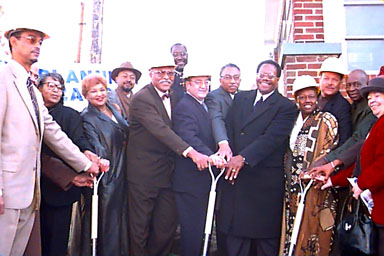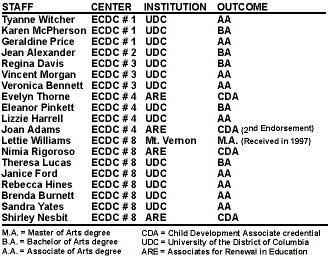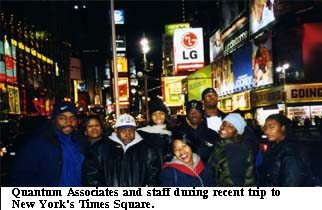UPO Breaks Ground for
Anacostia Community Center
“What a beautiful day for a groundbreaking,” were the
words spoken by a longtime Anacostia resident as people began
to arrive to UPO’s latest event. An estimated 150 neighborhood
residents, local elected officials, federal officials, business
and community leaders along with UPO family members all gathered
at 1649 Good Hope Road, Southeast Washington on December 3, 1999
for a ceremonial groundbreaking at a site that will soon contain
the UPO Anacostia Community Service Center, a state-of-the-art
facility that will provide quality services to Anacostia residents.
“I am extremely proud that we were
able to come here to break ground for a new 7,400 sq. ft. building
where we can provide top notch services to the community,”
observed Russell Simmons, UPO’s Board President.
Ward-8 Councilmember Sandy Allen, At-Large Councilmember Harold
Brazil, and former Councilmenber Wilhelmina Rolark gave rousing
remarks during the event that was hosted by WTTG-FOX 5’s
Meteorologist Andrew Humphries.
UPO secured an $850,000 construction loan
from Industrial Bank, as well as a $175,000 grant from the D.C.
Department of Housing and Community Development.
The Anacostia Center has called several sites its home in recent years, even suffering through a devastating fire in 1995 that destroyed the entire facility. Anacostia’s dedicated staff worked diligently during those tough times, making certain there was no “downtime.”
The new 7,400 square foot facility will include a computer lab and provide job training, educational services, crisis intervention, health/nutrition, senior citizens activities and youth services among others.
UPO Snares Record Head Start Grant
It has served DC’s children
since “before the beginning,” according to many who
have studied the local education arena. The United Planning Organization’s
Head Start program actually commenced activities prior to the
1965 roll-out of the national Head Start effort. UPO’s program,
which began in 1964, was used as a model for the new and exciting
education initiative that would ultimately become one of this
nation’s most popular, productive, and prominent early childhood
educational systems.
Today, UPO’s Office of Preschool
and Day Care oversees the largest Head Start and day care
activity in the region, caring for more than 2,400 children including
200 children who have various disabilities.
UPO recently received a record grant amount from the federal Department
of Health and Human Services’ Administration for Children
and Youth, the primary Head Start funding source. For the first
time in 35-years, UPO received a grant totaling nearly $12 million,
including $2.6 million in local matching funds. Additionally,
a DC grant totalling more than $600,000 is applied toward the
agency’s Early Head Start program. Along with its federal
funding, UPO receives funding from the District of Columbia’s
Department of Human Services Office of Early Head Start for day
care operations.
However, figures are only part of the story. Facts are also important
especially when one realizes that UPO Head Start and early childhood
development has since its inception, maintained a first rate and
quality educational program for our youngest community members.
Excellence is achieved by making certain its staff remains  up-to-date with the latest early childhood
education trends. Thus, 19 UPO Office of Preschool and Early Childhood
Development staff members are either currently enrolled or have
graduated from various institutions including the University of
the District of Columbia. These employees are studying the latest
early childhood education skills and techniques that will ultimately
benefit Washington, DC’s children. An example is Ms. Lettie
Williams who received a Master of Arts degree in Administration
and Supervision in 1997 from Mt. Vernon College. Ms. Williams,
a veteran UPO employee, is currently Center Director of UPO’s
Early Childhood Development Center # 8 located in northeast Washington.
Most others have completed certificate courses or are now enrolled
in academic programs at UDC or other local institutions.
up-to-date with the latest early childhood
education trends. Thus, 19 UPO Office of Preschool and Early Childhood
Development staff members are either currently enrolled or have
graduated from various institutions including the University of
the District of Columbia. These employees are studying the latest
early childhood education skills and techniques that will ultimately
benefit Washington, DC’s children. An example is Ms. Lettie
Williams who received a Master of Arts degree in Administration
and Supervision in 1997 from Mt. Vernon College. Ms. Williams,
a veteran UPO employee, is currently Center Director of UPO’s
Early Childhood Development Center # 8 located in northeast Washington.
Most others have completed certificate courses or are now enrolled
in academic programs at UDC or other local institutions.
One exciting program is Project Headway, part of the Institute
for Early Childhood Leadership Development at UDC. Project Headway
is geared mainly for persons who already have college credits.
Students may apply those credits along with Project Headway courses
toward an AA degree. Headway is designed to build capacity from
infant toddler through preschool.
Other important initiatives are now underway throughout the UPO
Head Start Network including the establishment of a new state-of-the-art
day care facility on the campus of the University of the District
of Columbia. Designated the UDC Early Childhood Development Center,
it is a UDC/UPO partnership where university students as well
as staff/faculty will enroll their children into a quality childcare
education center. The new facility is licensed to serve 30-children
at the Connecticut Avenue campus.
“The UPO Head Start and Early Childhood Development program
is a catalyst for the planning, development, and implementation
of comprehensive child and family development systems in partnership
with our delegate agencies and other public/private partners and
stakeholders,” noted William D. Hughey, director of the Office
of Preschool and Day Care. “During program year 1999-200,
we will put forth a massive effort to upgrade management systems
and procedures which will facilitate our ability to meet or exceed
all program performance standards,” he added.
Mr. Albert Williams, is Parent Policy Chairperson.
Quantum Helps Smooth Path for DC's Motivated
Young People
“It’s as if they’ve
been with UPO all the time” is the way one staff member puts
it when describing the agency’s many Quantum Opportunity
Program young people when they’re hard at work in their lab.
They’ve been a part of UPO for three years - their faces
and names are a part of UPO’s landscape.

Still, the 80 students (Quantum members are referred to as associates)
from many high schools throughout the region, come to UPO to help
fulfill their dreams as well as ultimate goals.
Funded by the U.S. Department of Labor and the DC Department of
Employment Services, QOP operates on $340,000 annually according
to Cecily A. Williams, the program coordinator. “The program
is based on relationships with the associates,” Ms. Williams
said, adding “our goal is to build stability in their lives.”
“Our associates are very motivated,” she says pointing
to the many accomplishments made since the UPO program began in
1996. UPO continues to be one of seven target cities nationwide
that operate QOP activities.
QOP associates are even now gearing-up for college life. They’ve
already visited several universities including a special trip
to various North Carolina institutions of higher learning where
they received a wide array of choice information. Among the colleges
were North Carolina A & T, University of North Carolina at
Greensboro, Elon College, Shaw University, St. Agustine, and North
Carolina Central.
In an effort to reward achievement as well as build teamwork,
associates have visited Virginia Beach and New York. They’ve
also appeared on a FOX television program dealing with crime prevention.
Quantum is slated to run through June 30, 2000 with the possibility
of a programmatic extension even beyond that date.
Families Find Success with Shelter Plus
Care
What happens to homeless
individuals who possess certain disabilities? What becomes of
people who may have once used illegal substances? The United Planning
Organization’s Shelter Plus Care Program is one solution
that is working to provide permanent housing specifically for
homeless families, where the heads of households have verified
disabilities that are either substance abuse and/or HIV/AIDS related.
Program guidelines require that children be included in the family
group. In fact, requirements specify that heads of households
be at least 18-years of age and have at least one child.
UPO provides case management services including development of
an Individual Case Plan, referral services, intervention, and
counseling. Others are supportive services, monitoring, and ongoing
home visitation. Since many participants lack educational and
stable employment histories, their main source of income is often
public assistance benefits.
According to program coordinator Jo Ann Featherson, MSW, program goals for participating clients and families are to strengthen and stabilize the family and to assist with client self sufficiency, so the customer ultimately functions at the highest possible level. To achieve the stated goals, customers are firmly told that “success is expected!” This helps lift customer self-esteem especially at a time when the world looks a bit dim to them. Several UPO Shelter Plus care customers are now employed in local industry, in some cases, holding down their first full-time job.
Currently eight families complete with
23 children participate in UPO’s Shelter-Plus Care Program.
Click here for previous issue of "UPO Reporter" newsletter.